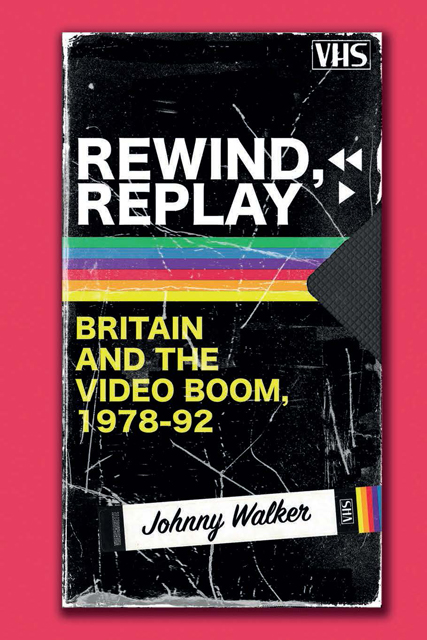Book contents
- Frontmatter
- Contents
- List of Figures
- Acknowledgements
- Introduction: Rewind, Replay
- 1 We’ve Got It Taped
- 2 Shrugging Off the Recession
- 3 Threats and Benefits
- 4 Regulation and Adaptation
- 5 Independent Spirit vs Corporate Muscle
- Conclusion: Video Legacies
- Select Bibliography
- Select Film/TV/Videography
- Select Periodicals
- Index
Conclusion: Video Legacies
Published online by Cambridge University Press: 18 November 2022
- Frontmatter
- Contents
- List of Figures
- Acknowledgements
- Introduction: Rewind, Replay
- 1 We’ve Got It Taped
- 2 Shrugging Off the Recession
- 3 Threats and Benefits
- 4 Regulation and Adaptation
- 5 Independent Spirit vs Corporate Muscle
- Conclusion: Video Legacies
- Select Bibliography
- Select Film/TV/Videography
- Select Periodicals
- Index
Summary
Rewind, Replay has mapped the evolution of video distribution and retail in Britain, from its beginnings in 1978 up to Blockbuster's acquisition of the Ritz Video chain in 1992. This chapter considers the post-Ritz video business in Britain and the legacy of the Britain's video boom in popular culture today.
My decision to draw things to a close in 1992, has, when I’ve presented parts of this research at conferences and the like, led to probing questions and comments from audience members. ‘Surely, it doesn't just end with Blockbuster?’ ‘1992 strikes me as somewhat of an arbitrary year.’ ‘What about DVD and Blu Ray? While we’re at it, what about Netflix?’ These questions are all valid, of course. And yes, as I remarked in the previous chapter, the story doesn't ‘just end’ with Blockbuster: the coming of DVD and subsequent technological developments – from rental-by-mail to Video on Demand – all impacted both distribution and retail in distinctive ways. Britain has stories to tell about all of this.
But one needs to end somewhere, and there is, in fact, good reason for wrapping things up (as much as one can) in the early 1990s. While I am wary to speak of any ‘clean breaks’ in British video history, Block-buster's acquisition of Ritz does signal a turning point for the domestic video business. I discuss in the introduction to this book how Blockbuster is regarded – as scholarly interventions by the likes of Guins, Herbert and Greenberg, and the film The Last Blockbuster, show – as an aggressive corporate force that had a dramatic and largely negative impact on the operations of the entire video business. Indeed, in Britain, by the mid-1990s, there were half the number of rental outlets in the UK as there had been in the late 1980s, with Blockbuster operating 10 per cent of these.
The success of Blockbuster in Britain represented somewhat of a double-edged sword. As Chapter 5 shows, the British video business needed a respectable face to quell the onslaught of negative publicity following the video nasties panic and the ensuing slump in video rentals, with Blockbuster's squeaky-clean image helping to appease the government, suggest that there was in fact a future for video shops, and afford the BVA some relief in the process.
- Type
- Chapter
- Information
- Rewind, ReplayBritain and the Video Boom, 1978-1992, pp. 215 - 226Publisher: Edinburgh University PressPrint publication year: 2022



